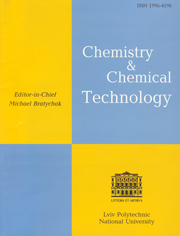Influence of Initiators on the Adhesion Properties of Bitumen Modified by Natural Origin Epoxide
| Attachment | Size |
|---|---|
| 257.09 KB |
[1] Airey G.: Fuel, 2003, 82, 1709. https://doi.org/10.1016/S0016-2361(03)00146-7
[2] Demchuk Y., Sidun I., Gunka V. et al.: Chem. Chem. Technol., 2018, 12, 456. https://doi.org/10.23939/chcht12.04.456
[3] Zhang W., Ding L., Jia Z.: Appl. Sci., 2018, 8, 457. https://doi.org/10.3390/app8030457
[4] Pyshyev S., Demchuk Y., Gunka V. et al.: Chem. Chem. Technol. 2019, 13, 212-217. https://doi.org/10.23939/chcht13.02.212
[5] Gunka V., Demchuk Yu., Pyshyev S. et al.: Petrol. Coal, 2018, 60, 1199.
[6] Gunka V., Sidun I., Solodkyy S., Vytrykush N.: Lecture Notes in Civil Eng. Proceedings of CEE 2019. Springer 2019, 47, 420.
[7] Wei J., Zhang Y.: J. Test. Eval., 2012, 40, 1169. https://doi.org/10.1520/JTE20120136
[8] Hrynchuk Y., Sidun I., Gunka V. et al.: Petrol. Coal, 2019, 61, 836.
[9] Nykypanchuk M., Hrynchuk Y., Olchovyk M.: Chem. Chem. Technol. 2013, 7, 467. https://doi.org/10.23939/chcht07.04.467
[10] Hrynchuk Y., Sidun I., Gunka V. et al.: Petrol. Coal, 2020, 62, 836.
[11] Demchuk Y., Gunka V., Pyshyev S. et al.: Chem. Chem. Technol., 2020, 14, 251. https://doi.org/10.23939/chcht14.02.251
[12] Martynyuk M.: Visnyk Prykarpat. Nats. Univ. im. Vasylya Stefanyka, 2014, V, 115. http://nbuv.gov.ua/UJRN/vpnu_chem_2014_18_16.
[13] Chemco System Co., 2012, “Epoxy Asphalt for Orthotropic Steel Bridge Decks,” http://www.chemcosystems.com/epoxy.html (Last accessed June 10, 2011).
[14] Apostolidis P., Liu X., van de Ven M. et al.: J. Transport. Res. Board., 2019, 2673, 551. https://doi.org/10.1177/0361198119835530
[15] Yu L.: Highway, 2004, 3, 56.
[16] Kang Y., Chen Z., Jiao Z., Huang W.: J. Appl. Polym. Sci., 2010, 116, 1678. https://doi.org/10.1002/app.31563
[17] Pan L., Wang Y., Wang C. et al.: Thermoset. Resin, 2011, 26, 33.
[18] Zhou X., Wu S., Liu G., Pan P.: Materials and Structures. Nanjing. 2016, 49, 241. https://link.springer.com/article/10.1617/s11527-014-0491-4
[19] Ivashkiv O, Astakhova O., Shyshchak O. et al.: Chem. Chem. Technol., 2015, 9, 69. https://doi.org/10.23939/chcht09.01.069
[20] Bratychak M., Brostow W., Grynyshyn O., Shyshchak O.: Mater. Res. Innovat., 2003, 7, 167. https://doi.org/10.1007/s10019-003-0243-5
[21] Alabaster D., Herrington P., Waters J.: J. Acoustic. Soc. Am., 2012, 131, 3225. https://doi.org/10.1121/1.4708028
[22] Al Fuhaid A., Lu Q., Luo S.: J. Mater. Civil Eng., 2018, 30, 256. https://doi.org/10.1061/(ASCE)MT.1943-5533.0002383
[23] EN 1427. European Standard. Bitumen and bituminous binders. Determination of the softening point. Ring and Ball method.
[24] EN 1426. European Standard. Bitumen and bituminous binders. Methods of tests for petroleum and its products. Determination of needle penetration.
[25] EN 13587. Bitumen and bituminous binders. Determination of the tensile properties of bituminous binders by the tensile test method.
[26] Pyrig Yan, Galkin A.: Bull. Kharkov Nat. Automobile and Highway Univ., 2019, 1, 202. https://doi.org/10.30977/BUL.2219-5548.2019.86.1.202
[27] http://online.budstandart.com/ua/catalog/doc-page?id_doc=27298










